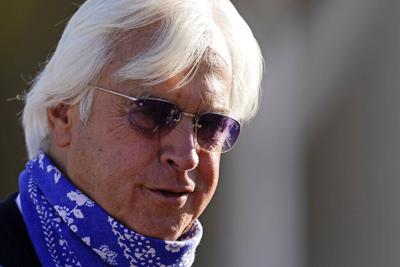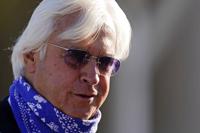The first time I heard Bob Baffert's name was in 1997. It was on television following the running of the 123rd Kentucky Derby, where a grey stallion named Silver Charm claimed victory, only Baffert's second time to enter a horse in the race. Just days before my high school graduation, Silver Charm's win came just as I was contemplating a career as a horse trainer myself.
There was certainly something captivating about the duo that called me to watch my first Preakness Stakes a few weeks later, where Silver Charm won again. And even though the beautiful grey horse fell short of claiming the Triple Crown with his defeat at the Belmont, Baffert became a national star.
As a lifelong horseman, I've always watched the Derby. Fortunately, my mentor convinced me training horses wasn't going to be a sustainable path for me, but I continued to follow the careers of Baffert, D. Wayne Lukas, and others. Aside from his track record, Baffert seems like a likeable enough guy, and for many years was quite successful at charming the media, fans of horse racing, and the betting public.
Baffert went on to claim more Derby titles and wins around the globe, but it wasn't until I attended the Preakness Stakes at Pimlico in 2015 that I paused to consider the conditions horses were being forced to endure. American Pharoah claimed victory that day just as the darkest of clouds and heaviest of rainstorms approached Pimlico Racetrack in Baltimore. As I stood drenched at the finish line, I wondered how anyone could choose to run a horse in the sloppy mess in front of us, and why they would endanger these horses by pushing them so hard in those conditions.
American Pharoah would go on to win the Belmont Stakes before a record-breaking crowd in Queens and fulfill Baffert's lifelong dream of claiming all three legs of the Triple Crown in Thoroughbred horse racing – the first since Affirmed in 1978, a 37-year drought. Soon after, I began to hear rumblings of drug abuse, doping, and other egregious practices in horse racing as I was working in Congress on horse racing and other animal-related issues at the time.
It wasn't long before I was recruited to head up the equine protection department at a national animal group in early 2016. One of the main reasons I decided to make the move was to launch a campaign to end doping and other abuses in the sport. Reps. Andy Barr, R-Ky., and Paul Tonko, D-N.Y., had just introduced the Thoroughbred Horseracing Integrity Act, which had only 20 House cosponsors when I turned my attention to it. A Senate companion measure hadn't even been introduced. It wasn't a perfect bill, and didn't ban Lasix, but it was a good start, something we felt we could get behind, and my gut told me it was something we could get done.
As each Congress passed, new versions of the bill were introduced that expanded the measure to cover other breeds of horses and eliminate the use of race-day medication while creating a uniform national standard for testing and enforcement with one national set of rules to be overseen by the U.S. Anti-Doping Agency.
As the issue was elevated, Congress held hearings on the matter in late 2016, and again in 2018. Soon thereafter a rash of racehorse deaths at Baffert's home track, Santa Anita Park, in Arcadia, Calif., drew national attention, as horses were dropping like flies. The public outrage grew and ultimately led to a terrible discovery: Justify, Bob Baffert's second Triple Crown winner, who claimed victory in 2018, had a dirty little secret.
The public learned that Justify had testified positive for an illegal drug when he won the Santa Anita Derby, a qualifier for the Kentucky Derby and ultimately a key step for the horse to become only the 13th in American history to win all three Triple Crown races. That positive drug test was swept under the rug by the California Horse Racing Board (CHRB), whose vice-chairman also had a horse in training with Baffert at the time.
That incident sparked tremendous controversy in American horse racing, and nothing was done to rectify the situation. That's when the tide turned against Bob Baffert. Justify remains the official winner of each of those races, despite the fact that California Governor Gavin Newsom cleaned house at the CHRB and removed those who were in power when the Justify scandal occurred.
Fast forward to January 2020. A third hearing in the U.S. House of Representatives was held on the then-Horseracing Integrity Act. I testified before Congress in support of the bill and discussed the Santa Anita deaths as well as the Justify scandal in my remarks.
A few weeks later, the FBI raided numerous stables in Florida, and the U.S. Dept. of Justice indicted 27 trainers, owners, veterinarians, and other parties in the largest illegal doping scandal the horse world has ever seen.
To his credit, Baffert penned an op-ed that week in support of the anti-doping legislation, but it was already too late – the Washington Post, published an editorial the same day as Baffert's piece entitled "Horseracing Has Outlived Its Time." The unthinkable for the industry was now in print with one of America's key newspapers of record. That would get the attention of the horse racing world but concerns about horse racing were subordinated to the national crisis over the pandemic.
But one reader was still paying attention: U.S. Senate Republican Leader Mitch McConnell, a regular at the Kentucky Derby in McConnell's hometown of Louisville, where McConnell's political career was born as judge executive in the 1980s. The Post's headline hit too close to home for McConnell. He soon stepped into action and used his wherewithal to bring the last major holdout in Thoroughbred racing to the table: Churchill Downs, the parent company that owns and operates the Derby.
By fall of 2020, McConnell, Barr, Tonko, Sen. Kirsten Gillibrand, D-N.Y., and those of us in the Coalition for Horseracing Integrity forged a new bill: the Horseracing Integrity and Safety Act (HISA). It not only accomplished a ban on race-day medication and establishment of a national standard and set of rules, but it also contained a new safety provision brought by McConnell and an unlikely ally, Sen. Dianne Feinstein, D-Calif. We saw the enactment of HISA in December of 2020, and the measure takes effect this July. Good things come to those who wait, and the horses have waited for decades to see reform.
But we knew there'd be no fairy tale ending to this story, as numerous lawsuits were filed in an effort to derail the implementation of the new law.
Enter Medina Spirit.
The little bay colt that sold for $1,000 at the Ocala Breeders' Sale in 2019, the only bid the horse received, lived the most tragic life and death in horse racing since Eight Belles.
Medina Spirit, a very unlikely candidate to win the Kentucky Derby, crossed the finish line first last May and was widely celebrated as a real-life Cinderella story. That is until a blood test came back weeks later showing the colt tested positive for betamethasone, an agent that can be used to mask pain and enhance a horses' performance if used for that purpose. A second positive test from the split sample further corroborated the use of the drug.
A firestorm of press came quickly as Baffert claimed there was no possibility that the horse could have tested positive for Betamethasone and that the "cancel culture" that he believes has consumed the U.S. put a bullseye on the embattled trainer. A likely story for someone with dozens of repeated drug violations.
Baffert later walked back his tale as veterinarians confirmed a substance named Otomax was used on Medina Spirit, and that betamethasone was indeed a key ingredient.
Churchill Downs swiftly barred Baffert from competing at the Kentucky Derby or any other race held on the grounds of any Churchill property for two years.
The New York Racing Association (NYRA), operator of the Belmont Stakes followed suit, and barred Baffert from its tracks as well, preventing him from running horses in the third leg of the Triple Crown.
These leaders made the right decision and did right by the horse.
But Pimlico Racetrack and the Preakness Stakes in Baltimore took a different path, allowing Baffert to run the colt in the second leg despite the positive drug test. Pimlico felt tremendous backlash as the move was deemed "business as usual in Baltimore." Medina Spirit remained under around-the-clock observation, and the little horse finished third with no drugs in his system.
Lawsuits began flying around as Baffert challenged those who sought to punish him for what NYRA called "taking a wrecking ball" to American horse racing by continuing to press the envelope and ignore the rules of the game.
The Kentucky Horse Racing Commission (KHRC) went further in 2022 to suspend Baffert for 90 days, effectively preventing him from running in the Derby this year. Baffert appealed three times, on up to the Kentucky Appellate Court, but lost in each attempt. And the KHRC stripped Medina Spirit of the Derby title.
And on Monday, Baffert's suspension officially began. Through reciprocity, the California Horse Racing Board, with new appointees who aren't willing to tolerate Baffert's arrogance, issued a suspension and sent Baffert packing, taking down the trainer's signs at his home base at Santa Anita. The New York State Gaming Commission shuttered him as well.
There's one thing for sure, there will be no Bob Baffert Triple Crown winner this year.
The public is fed up with Bob Baffert's shenanigans, and most of the leaders in the world of horse racing have now recognized what a tremendous liability Baffert is for the so-called "Sport of Kings." I do wonder, has Bob Baffert jumped the shark? Only time will tell.
And to top off this good news, a Federal Judge in Texas just threw out the lawsuit that attempted to derail HISA, effectively upholding the first new horse protection law enacted in half a century. It's no surprise to those of us who were steeped in the making of it, as some of the most brilliant legal minds in Congress, the animal protection space, and horse racing prepared a litigation-proof bill that is clearly within the confines of the U.S. Constitution and Commerce Clause.
There's much to celebrate on the first Saturday in May this year, far more than any Derby before. Justice and the welfare of the horses have prevailed in the courts, and Bob Baffert, who I'm sure we'll hear more about later, will have to sit this one out and will hopefully consider his own reformation. It's too late for Medina Spirit, but is it too late for him?
Marty Irby is the executive director at Animal Wellness Action in Washington, D.C., and is a former 8-time world champion equestrian who was honored in 2020 by Her Majesty Queen Elizabeth, II for his work to protect animals.



